Top 5 Arweave alternatives in 2025
Arweave too expensive? We review the top 5 cheaper alternatives to storing data permanently on the blockchain. See how alternatives like Filecoin and Siacoin compare on price, security, and more.
Arweave stands as a unique player in the decentralized data storage arena, known for its innovative approach to permanent data storage. Utilizing a distinctive blockweave technology, a variation of blockchain, Arweave enables users to store data indefinitely with a one-time payment. This model is particularly appealing for archiving digital assets, historical data, and ensuring the longevity of information in an immutable format.However, the landscape of decentralized storage includes several alternatives to Arweave, each with its own set of features and focus areas. Services like Filecoin and Storj offer decentralized storage solutions, emphasizing security and privacy, but with more flexible storage terms compared to Arweave's permanent model. IPFS (InterPlanetary File System), utilized by platforms like Pinata, provides a peer-to-peer protocol for storing and sharing data in a distributed file system, focusing on efficiency and ease of access.
These alternatives cater to a range of needs from temporary and dynamic data storage (like Storj and Pinata) to more secure and long-term solutions (like Filecoin), offering different pricing models, security features, and performance levels. While Arweave is ideal for users seeking permanent data storage, these alternatives provide varied options for those needing more flexibility or specific features in decentralized data management.
what is Arweave Alternatives
Arweave alternatives refer to other decentralized data storage and archiving solutions that can be considered as substitutes or options instead of Arweave. These alternatives offer various features, pricing models, and use cases, catering to different needs and preferences in the realm of decentralized storage.Arweave, known for its blockweave technology and focus on permanent data storage, has unique characteristics. However, users might explore alternatives for various reasons, such as cost-effectiveness, flexibility, or specific features like temporary storage options or enhanced privacy.Some well-known Arweave alternatives include platforms like Filecoin, Storj, Pinata, and IPFS (InterPlanetary File System), each offering a distinct approach to decentralized data storage. These alternatives have their strengths, use cases, and advantages, and users evaluate them based on their specific requirements for data storage, retrieval, and management.
Top 7 Arweave Alternatives
1.Arcana.network
2.Storj Labs
3.Akash
4.Functionland
5.Impossible Cloud
6.Skynet
7.Filecoin
1.Arcana.network
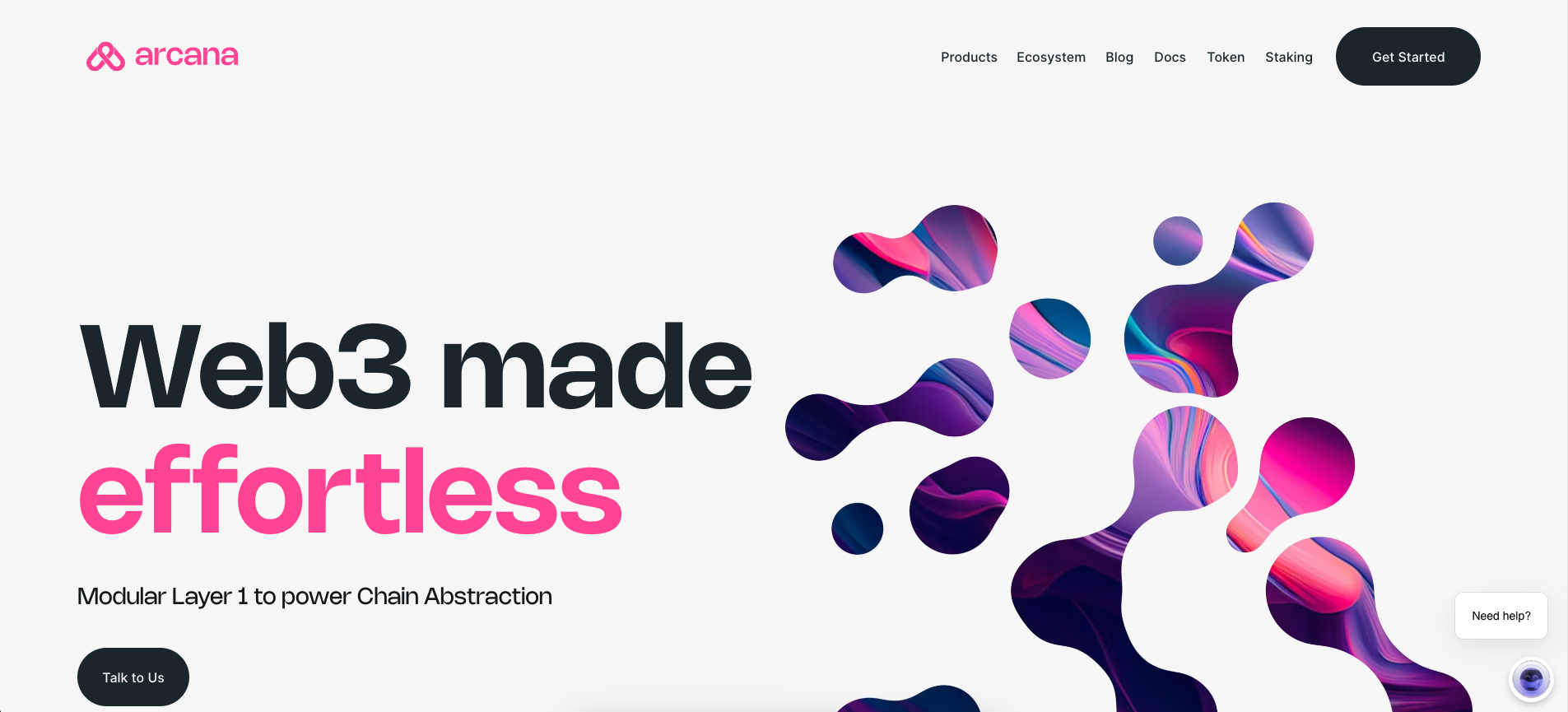
Arcana Network stands out in the blockchain space for providing decentralized storage and privacy-focused solutions, especially catering to the needs of dApp developers. It emphasizes user privacy and data security, leveraging blockchain technology to create a more secure and transparent digital environment.
Arcana Network operates by offering developers tools to integrate privacy and storage components into their applications seamlessly. Its features include decentralized identity, access control, and end-to-end encryption, ensuring that user data remains private and secure. By utilizing distributed ledger technology, Arcana not only enhances data security but also brings transparency and immutability to the processes.
The platform is designed to be developer-friendly, offering APIs and SDKs that make integration straightforward. This approach enables developers to focus on building their applications without worrying about the complexities of blockchain technology.
2.Storj Labs
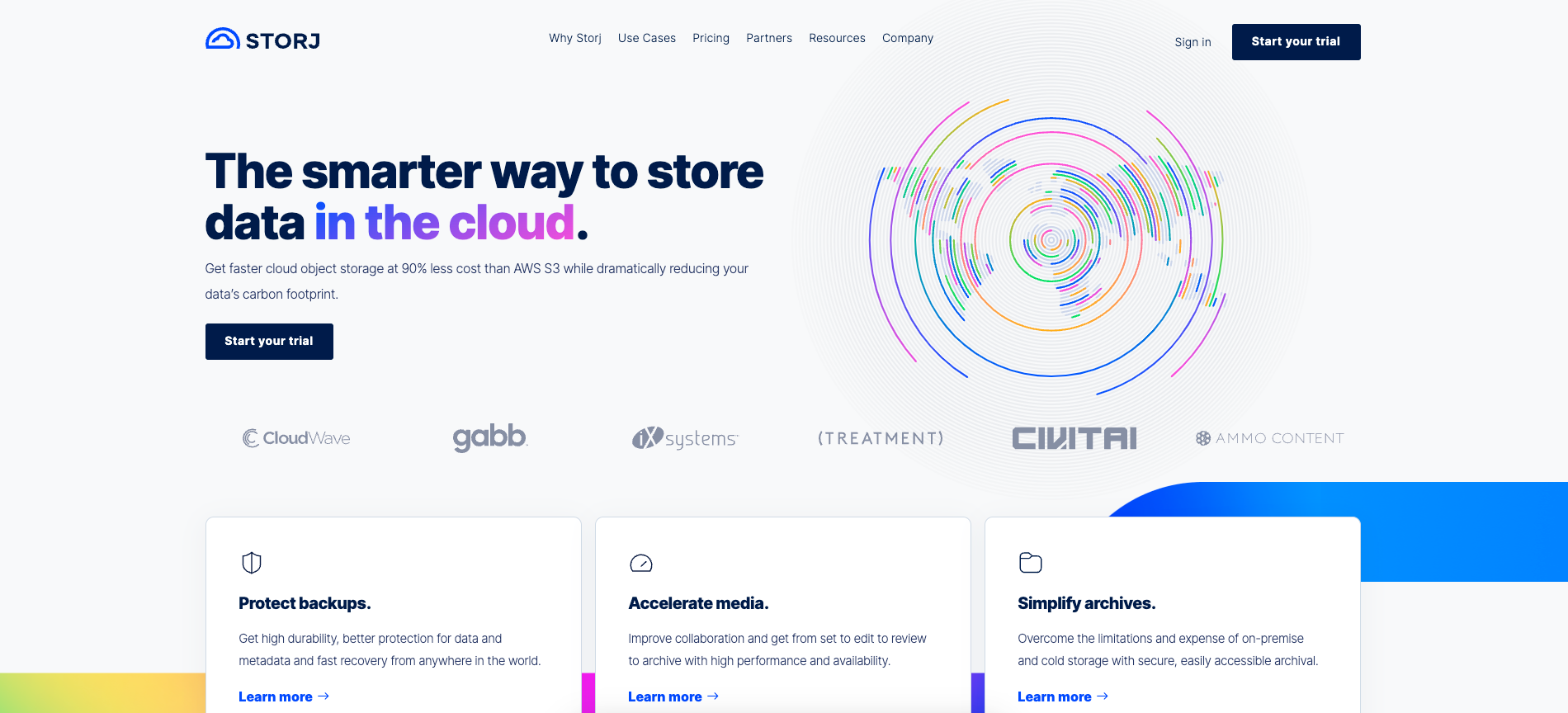
Storj Labs is a notable player in the world of decentralized storage, offering globally distributed cloud object storage solutions. With a focus on security, privacy, and efficiency, Storj Labs provides a unique approach to data storage and retrieval.Storj's decentralized storage network is built on a peer-to-peer architecture, allowing users to store and retrieve data across a distributed network of nodes. This approach enhances data security and resilience, as files are divided into smaller, encrypted pieces and stored across multiple nodes. It not only protects data from single points of failure but also ensures privacy, as only the data owner possesses the encryption keys.One of Storj's standout features is its emphasis on enhanced security and privacy, making it an attractive option for users concerned about the confidentiality of their stored data. Additionally, Storj offers a pay-as-you-go pricing model, providing cost-effective storage solutions for a variety of use cases.
3.Akash
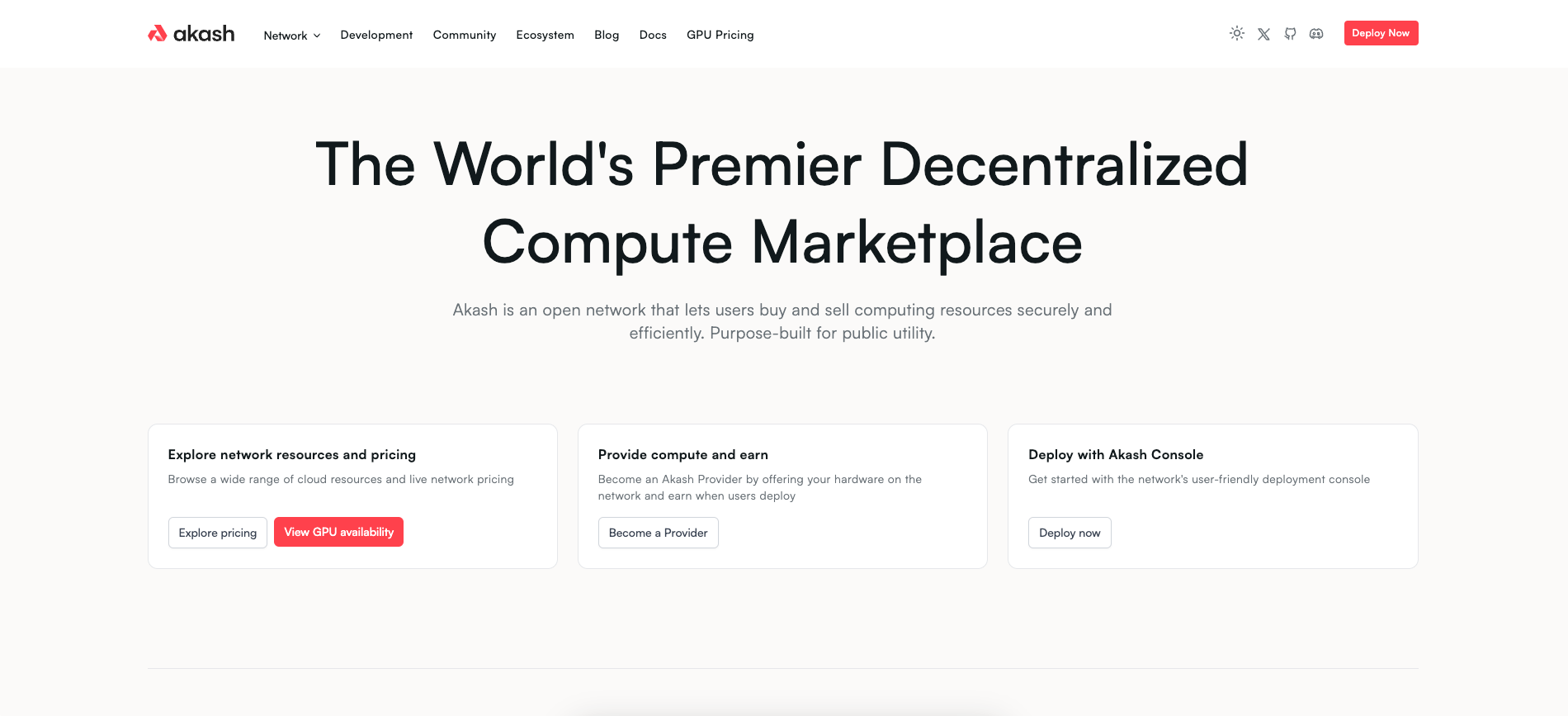
Akash is a unique and innovative platform that offers an open marketplace for idle compute capacity. It focuses on providing a decentralized solution for managing containerized workloads, making it a significant player in the world of cloud computing and decentralized cloud services.At its core, Akash enables users to leverage the unused computing power of data centers and individual servers, creating a marketplace for resources. This approach benefits both resource providers, who can monetize their idle capacity, and users, who gain access to cost-effective and scalable cloud computing resources.One of the key advantages of Akash is its support for containerized workloads. Users can deploy and manage their applications in containers, which offer portability and flexibility. This approach aligns well with modern DevOps practices and microservices architectures.
4. Functionland

Functionland is a notable platform that combines blockchain technology with storage solutions, offering a concept known as "blockchain-attached storage." Additionally, it incorporates an intriguing feature: the automatic minting of cryptocurrency for users.Blockchain-attached storage in Functionland means that users can store data while simultaneously engaging with blockchain technology. This integration allows for unique use cases where data storage and blockchain operations are interconnected, potentially enhancing data security and transparency.The platform's auto-minting feature is particularly interesting. It means that users can automatically create or generate cryptocurrency as they utilize the platform's services. This provides an incentive for users to store data and engage with the blockchain-attached storage while being rewarded with cryptocurrency.
5. Impossible Cloud
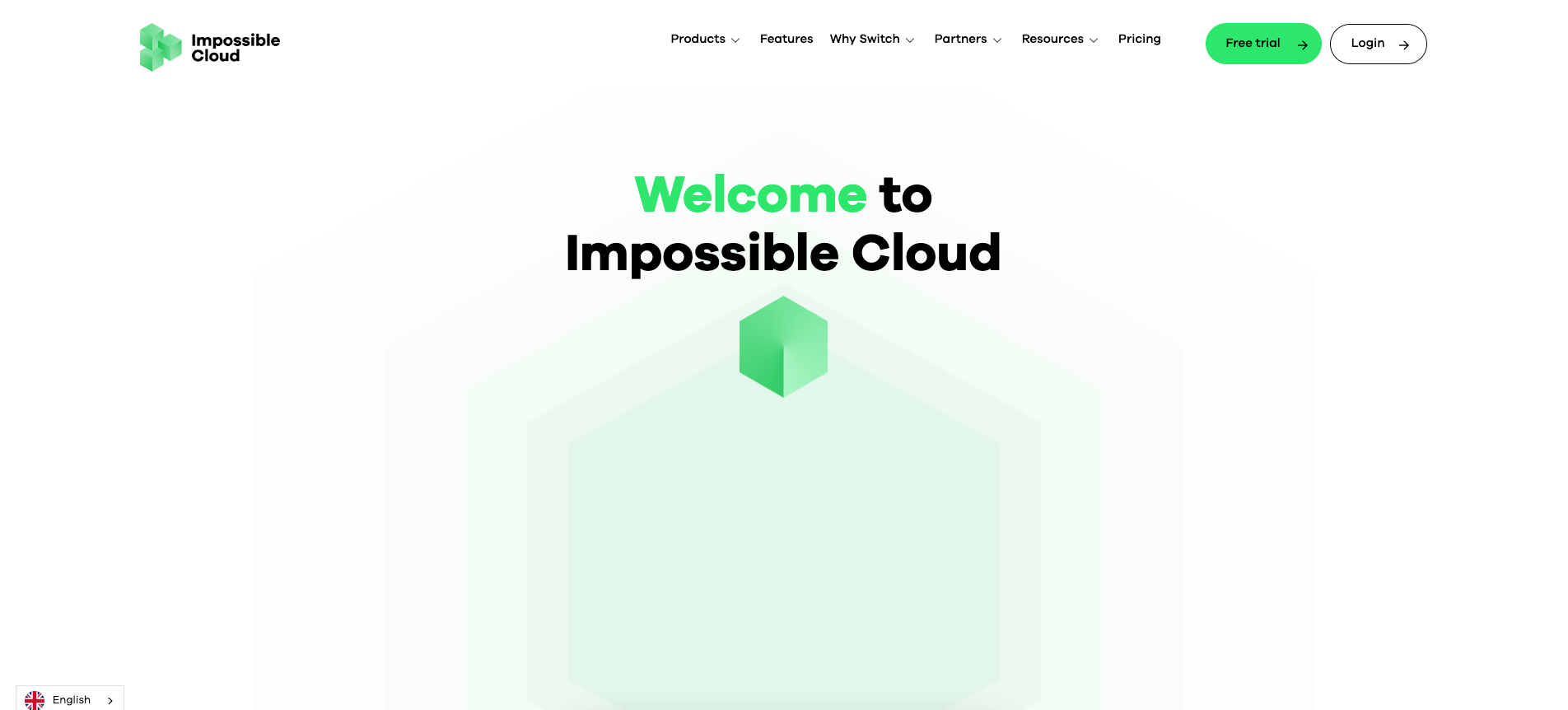
Impossible Cloud is an intriguing platform that offers decentralized, multi-service cloud solutions. It caters to users seeking innovative cloud computing alternatives with an emphasis on decentralization. Additionally, it incorporates a fiat-based payment system designed for business-to-business (B2B) customers.One of the standout features of Impossible Cloud is its commitment to decentralization. It provides a range of cloud services distributed across a decentralized network, ensuring data redundancy and resilience against potential failures. This approach aligns with the principles of decentralization, enhancing data security and accessibility.The inclusion of a fiat-based payment system specifically tailored for B2B customers is a notable aspect. It makes Impossible Cloud a more accessible choice for businesses that prefer traditional currency transactions while benefiting from decentralized cloud services.
6.Skynet
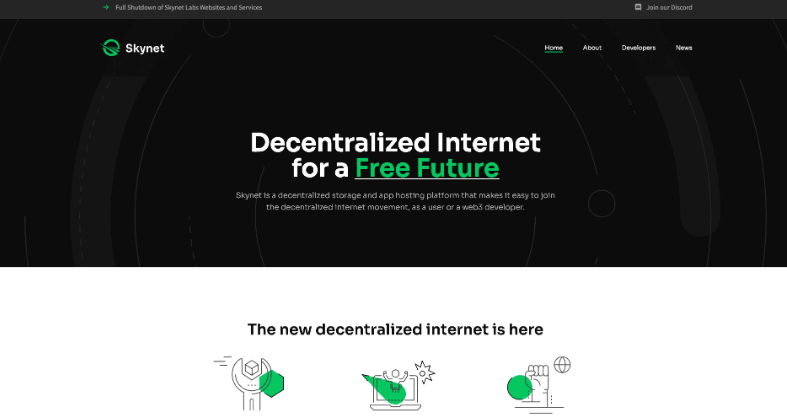
Skynet is a decentralized data storage platform that operates on the Sia blockchain, offering innovative solutions for users seeking secure and efficient data storage and retrieval. At its core, Skynet provides a decentralized alternative to traditional cloud storage services. Users can store their data on the Skynet network, which is powered by the underlying Sia blockchain technology. This approach ensures data security and reliability through its decentralized and distributed storage model.One of Skynet's notable features is its use of storage smart-contracts on the Sia blockchain. These smart contracts enable users to define the terms of their data storage agreements, ensuring transparency and trust in the storage process. Users can specify storage duration, redundancy levels, and other parameters, providing a customizable and flexible approach to data storage.
7.Filecoin
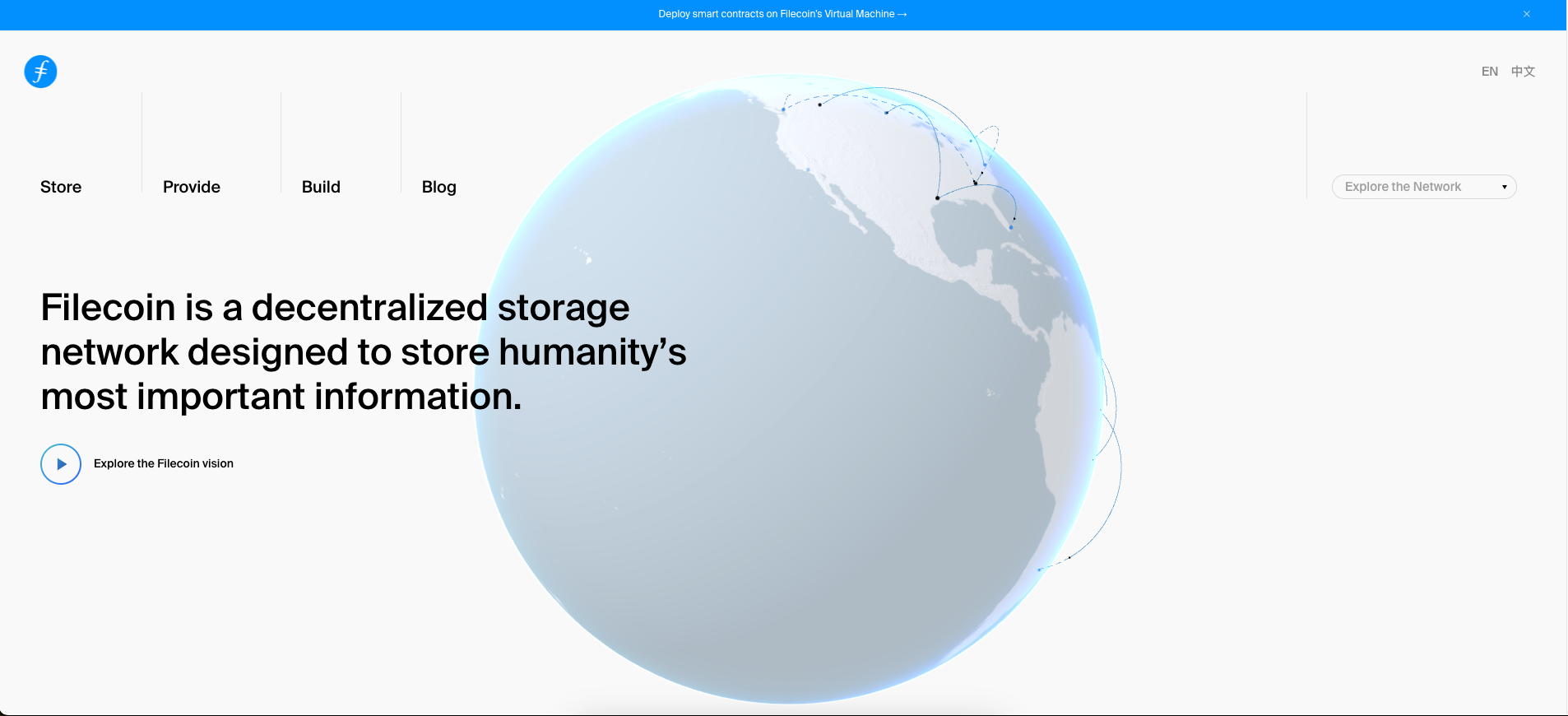
Filecoin is a notable open-source cloud storage marketplace that addresses the critical aspects of data storage and retrieval in a decentralized manner. Emerging as a key player in the realm of distributed storage solutions, Filecoin leverages blockchain technology to create a global network where users can store and retrieve data securely and efficiently.At its core, Filecoin serves as a marketplace, connecting those who have unused storage space with users in need of data storage. It operates on a unique incentive model, where storage providers are rewarded with Filecoin tokens for offering their storage resources. This innovative approach not only ensures cost-effective storage but also enhances the availability and redundancy of data.Filecoin's decentralized architecture is a significant advantage, making it resistant to single points of failure and ensuring data remains accessible even in adverse conditions. This decentralized and trustless network architecture contributes to its appeal as a robust alternative to traditional cloud storage solutions.
Performance and Reliability: Arweave vs. Its Competitors
Performance and reliability are paramount considerations when evaluating decentralized storage solutions, and Arweave faces competition from several notable alternatives in this regard. In this comparison, we delve into the key performance and reliability factors distinguishing Arweave from its competitors.
Arweave: A Focus on Permanence
Arweave's performance is characterized by its unyielding focus on permanence. Data stored on Arweave becomes part of the permaweb, accessible indefinitely with a one-time payment. While it excels in ensuring that data remains intact and immutable, this focus on permanence may come with trade-offs in terms of data retrieval speed and flexibility for some use cases.
Filecoin: Balancing Redundancy and Accessibility
Filecoin offers an innovative incentive model for storage providers, enhancing data redundancy and availability. However, its performance can vary based on network conditions and the geographical distribution of storage nodes. Users seeking a balance between data reliability and performance may find Filecoin appealing.
Storj: Enhanced Security and Privacy
Storj prioritizes security and privacy, employing encryption and a decentralized network of nodes to safeguard data. This approach enhances data protection but may lead to slightly slower data retrieval times compared to centralized solutions. Storj's performance is particularly attractive to users valuing data confidentiality.
Pinata: User-Friendly Access to IPFS
Pinata simplifies the use of IPFS, focusing on user-friendliness and ease of content management. While it ensures efficient access to content on IPFS, the performance may depend on the underlying IPFS network's speed and reliability. Pinata's user-centric approach appeals to those seeking accessibility.
Sia: Robust and Decentralized
Sia's performance shines in its robustness and decentralization. Data is divided into smaller pieces, enhancing redundancy and data availability. While this approach ensures data resilience, it may result in slightly longer retrieval times compared to centralized storage solutions.
IPFS (InterPlanetary File System): Versatile and Efficient
IPFS, employed by platforms like Pinata, offers versatile and efficient decentralized data storage and retrieval. Its performance benefits from a distributed architecture, allowing for content to be cached locally. However, performance can vary based on the geographical distribution of IPFS nodes.
Key Differences
- Storage Permanence: Arweave's unique selling point is its focus on permanent, immutable storage, which is a stark contrast to the more flexible, temporary storage solutions offered by Filecoin, Storj, and Sia.
- Technology and Infrastructure: Arweave's blockweave technology is distinct from traditional blockchain technology used by Filecoin and Sia. Storj, meanwhile, differentiates itself with its advanced encryption and sharding techniques.
- Pricing Model: Arweave’s endowment model is unique, offering a one-time payment for long-term storage, whereas Filecoin, Storj, and Sia typically operate on a usage-based pricing model.
- Use Case Suitability: Arweave is best suited for data that needs permanent preservation, while Filecoin, Storj, and Sia cater to a broader range of general storage needs, including dynamic cloud storage and low-cost solutions.
FAQS
What are Arweave alternatives?
Arweave alternatives refer to other decentralized data storage solutions that users can consider as substitutes or options instead of Arweave for their data storage needs.
Why should I consider Arweave alternatives?
Considering alternatives to Arweave is essential to explore different features, pricing models, and use cases, allowing you to make an informed choice based on your specific data storage requirements.
What are the advantages of Arweave alternatives?
Arweave alternatives offer a range of advantages, such as cost-effectiveness, flexibility, enhanced privacy, and different approaches to data storage and retrieval.
How do Arweave alternatives compare to Arweave in terms of data permanence?
Arweave is known for permanent data storage, while alternatives may offer different models. Some prioritize data permanence, while others focus on flexibility or temporary storage.
Do Arweave alternatives offer cost-effective solutions?
Yes, many Arweave alternatives provide cost-effective storage options, with pricing models that suit various budgets and usage pattern

